De teama valului de refugiați din Afganistan, Turcia construieşte un zid lung de 295 km la graniţa cu Iranul
În timp ce mii de afgani fug de țară, Turcia a anunțat construcția unui zid de-a lungul frontierei sale cu Iranul, pentru a face față unui potențial val de refugiați din Afganistan.
Zidul va avea 295 kilometri lungime și va fi întărit cu sârmă ghimpată și șanțuri.
"Vom intensifica lucrările și vom întări astfel mesajul că granițele noastre sunt de netrecut", a declarat ministrul turc al Apărării Hulusi Akar, potrivit Digi24.
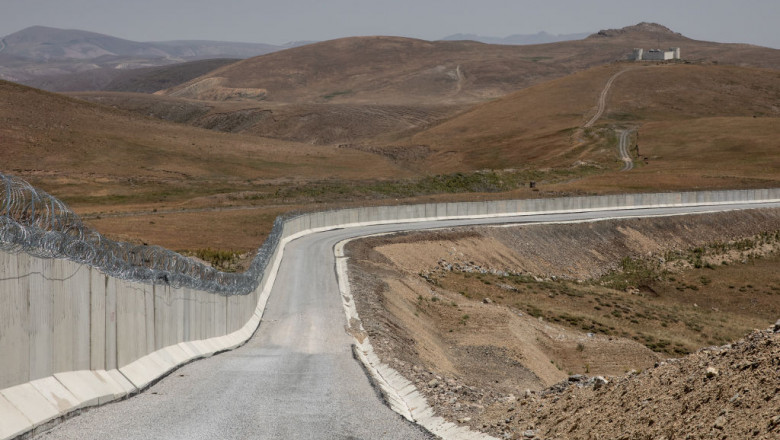 Getty Images
Getty Images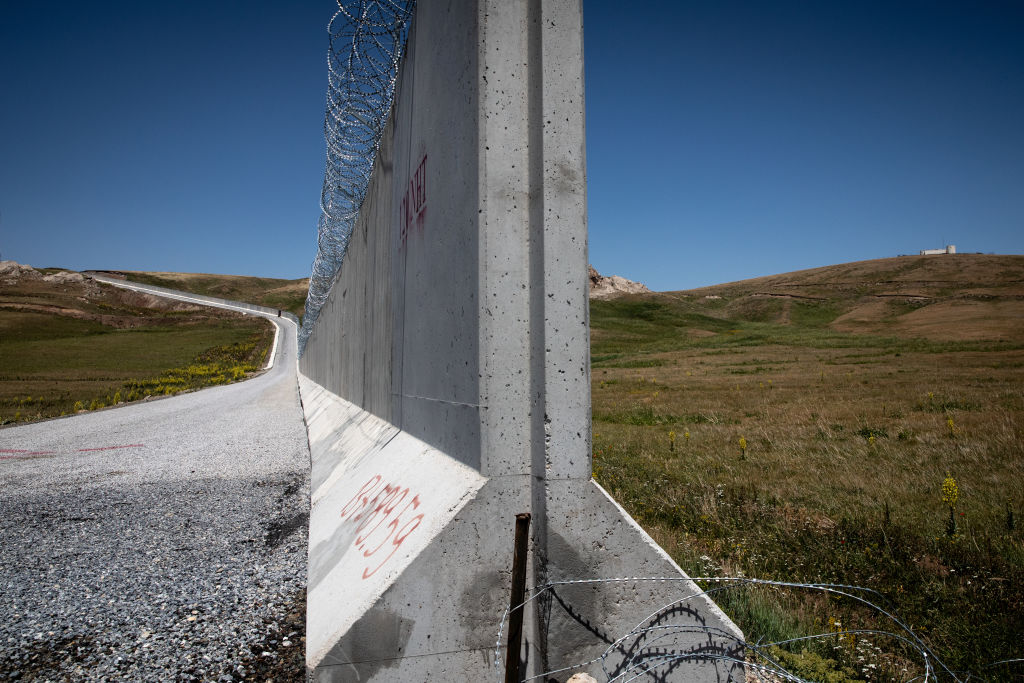 CALDIRAN, TURKEY - JULY 10: An Iranian border outpost, far right, is seen behind a part of Turkeyâs newly completed border wall on the Turkey-Iran border on July 10, 2021 in Caldiran, Turkey. A growing number of Afghan refugees are fleeing into Turkey as the Taliban escalates its military offensive and the United States nears completion of its troop withdrawal after a two-decade war. Since US President Joe Biden announced the August 31 pull-out deadline, the Taliban advance has been swift, with reports claiming they have taken control of more than half of the countryâs 400 districts. Over the past months, Turkey has seen a steady rise in Afghan migrants, most entering the country illegally via a centuries-old smuggling route through Iran. The numbers may rise further after the US announced an expansion of its refugee program for those who worked for the US but did not qualify for Special Immigrant Visas. These Afghans, who are not eligible for evacuation flights, would have to leave Afghanistan on their own before receiving US assistance. Turkey is a likely destination. The Afghans migrating to Turkey via Iran travel largely on foot, navigating the treacherous mountain range that makes up the Iran-Turkey border. Assisted by an organized network of smugglers, migrants pay upwards of $1000 USD per person for a journey through safe houses, across Van Lake, around land-border checkpoints, and onward to cities like Ankara and Istanbul. Migrants often report severe beatings by Iranian border guards and poor safe house conditions, while the mountain crossing and boat trips have claimed many lives. Turkeyâs law enforcement agencies have stepped up efforts to break up the smuggling networks, in a bid to slow rising numbers and protect migrant lives. As the security condition in Afghanistan continues to deteriorate, fears of a new refugee crisis loom. (Photo by Chris McGrath/Getty Images)
CALDIRAN, TURKEY - JULY 10: An Iranian border outpost, far right, is seen behind a part of Turkeyâs newly completed border wall on the Turkey-Iran border on July 10, 2021 in Caldiran, Turkey. A growing number of Afghan refugees are fleeing into Turkey as the Taliban escalates its military offensive and the United States nears completion of its troop withdrawal after a two-decade war. Since US President Joe Biden announced the August 31 pull-out deadline, the Taliban advance has been swift, with reports claiming they have taken control of more than half of the countryâs 400 districts. Over the past months, Turkey has seen a steady rise in Afghan migrants, most entering the country illegally via a centuries-old smuggling route through Iran. The numbers may rise further after the US announced an expansion of its refugee program for those who worked for the US but did not qualify for Special Immigrant Visas. These Afghans, who are not eligible for evacuation flights, would have to leave Afghanistan on their own before receiving US assistance. Turkey is a likely destination. The Afghans migrating to Turkey via Iran travel largely on foot, navigating the treacherous mountain range that makes up the Iran-Turkey border. Assisted by an organized network of smugglers, migrants pay upwards of $1000 USD per person for a journey through safe houses, across Van Lake, around land-border checkpoints, and onward to cities like Ankara and Istanbul. Migrants often report severe beatings by Iranian border guards and poor safe house conditions, while the mountain crossing and boat trips have claimed many lives. Turkeyâs law enforcement agencies have stepped up efforts to break up the smuggling networks, in a bid to slow rising numbers and protect migrant lives. As the security condition in Afghanistan continues to deteriorate, fears of a new refugee crisis loom. (Photo by Chris McGrath/Getty Images)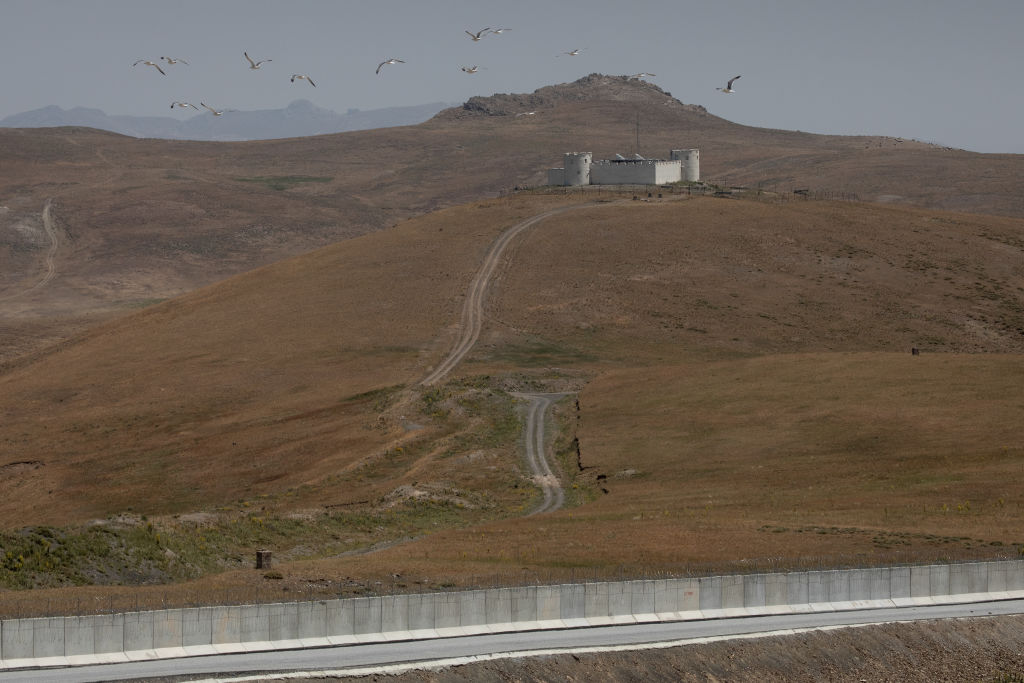 CALDIRAN, TURKEY - JULY 10: An Iranian border outpost is seen behind a part of Turkeyâs newly completed border wall on the Turkey-Iran border on July 10, 2021 in Caldiran, Turkey. A growing number of Afghan refugees are fleeing into Turkey as the Taliban escalates its military offensive and the United States nears completion of its troop withdrawal after a two-decade war. Since US President Joe Biden announced the August 31 pull-out deadline, the Taliban advance has been swift, with reports claiming they have taken control of more than half of the countryâs 400 districts. Over the past months, Turkey has seen a steady rise in Afghan migrants, most entering the country illegally via a centuries-old smuggling route through Iran. The numbers may rise further after the US announced an expansion of its refugee program for those who worked for the US but did not qualify for Special Immigrant Visas. These Afghans, who are not eligible for evacuation flights, would have to leave Afghanistan on their own before receiving US assistance. Turkey is a likely destination. The Afghans migrating to Turkey via Iran travel largely on foot, navigating the treacherous mountain range that makes up the Iran-Turkey border. Assisted by an organized network of smugglers, migrants pay upwards of $1000 USD per person for a journey through safe houses, across Van Lake, around land-border checkpoints, and onward to cities like Ankara and Istanbul. Migrants often report severe beatings by Iranian border guards and poor safe house conditions, while the mountain crossing and boat trips have claimed many lives. Turkeyâs law enforcement agencies have stepped up efforts to break up the smuggling networks, in a bid to slow rising numbers and protect migrant lives. Turkey already hosts more than 5.5 million asylum seekers. As the security condition in Afghanistan continues to deteriorate, fears of a new refugee crisis loom. (Photo by Chris McGrath/Getty Images)
CALDIRAN, TURKEY - JULY 10: An Iranian border outpost is seen behind a part of Turkeyâs newly completed border wall on the Turkey-Iran border on July 10, 2021 in Caldiran, Turkey. A growing number of Afghan refugees are fleeing into Turkey as the Taliban escalates its military offensive and the United States nears completion of its troop withdrawal after a two-decade war. Since US President Joe Biden announced the August 31 pull-out deadline, the Taliban advance has been swift, with reports claiming they have taken control of more than half of the countryâs 400 districts. Over the past months, Turkey has seen a steady rise in Afghan migrants, most entering the country illegally via a centuries-old smuggling route through Iran. The numbers may rise further after the US announced an expansion of its refugee program for those who worked for the US but did not qualify for Special Immigrant Visas. These Afghans, who are not eligible for evacuation flights, would have to leave Afghanistan on their own before receiving US assistance. Turkey is a likely destination. The Afghans migrating to Turkey via Iran travel largely on foot, navigating the treacherous mountain range that makes up the Iran-Turkey border. Assisted by an organized network of smugglers, migrants pay upwards of $1000 USD per person for a journey through safe houses, across Van Lake, around land-border checkpoints, and onward to cities like Ankara and Istanbul. Migrants often report severe beatings by Iranian border guards and poor safe house conditions, while the mountain crossing and boat trips have claimed many lives. Turkeyâs law enforcement agencies have stepped up efforts to break up the smuggling networks, in a bid to slow rising numbers and protect migrant lives. Turkey already hosts more than 5.5 million asylum seekers. As the security condition in Afghanistan continues to deteriorate, fears of a new refugee crisis loom. (Photo by Chris McGrath/Getty Images)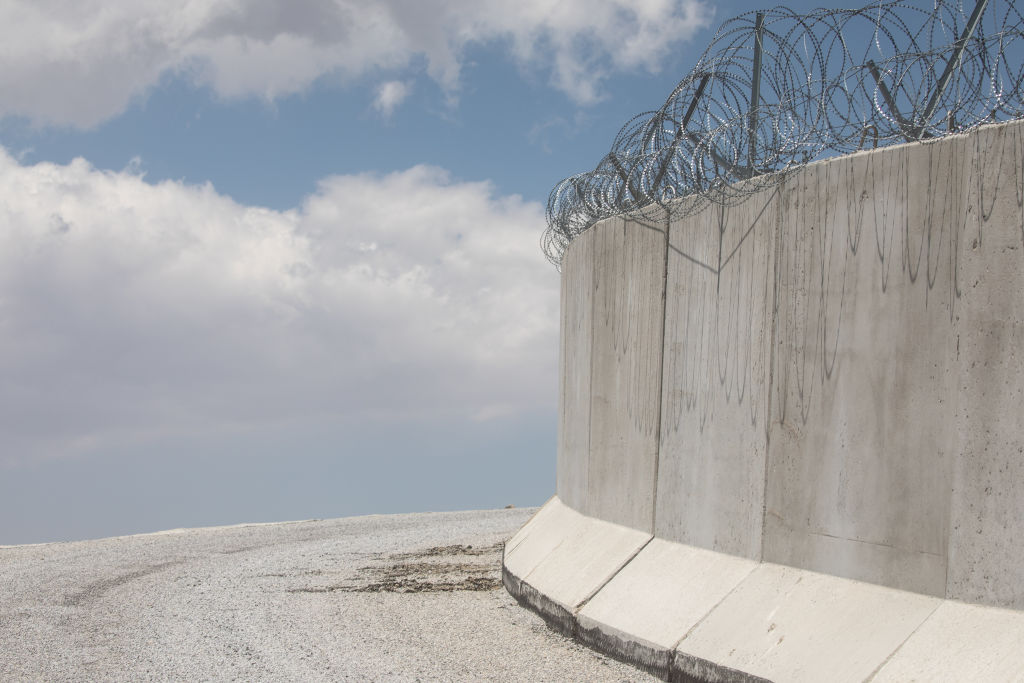 CALDIRAN, TURKEY - JULY 10: A part of Turkeyâs newly completed border wall is seen on the Turkey-Iran border on July 10, 2021 in Caldiran, Turkey. A growing number of Afghan refugees are fleeing into Turkey as the Taliban escalates its military offensive and the United States nears completion of its troop withdrawal after a two-decade war. Since US President Joe Biden announced the August 31 pull-out deadline, the Taliban advance has been swift, with reports claiming they have taken control of more than half of the countryâs 400 districts. Over the past months, Turkey has seen a steady rise in Afghan migrants, most entering the country illegally via a centuries-old smuggling route through Iran. The numbers may rise further after the US announced an expansion of its refugee program for those who worked for the US but did not qualify for Special Immigrant Visas. These Afghans, who are not eligible for evacuation flights, would have to leave Afghanistan on their own before receiving US assistance. Turkey is a likely destination. The Afghans migrating to Turkey via Iran travel largely on foot, navigating the treacherous mountain range that makes up the Iran-Turkey border. Assisted by an organized network of smugglers, migrants pay upwards of $1000 USD per person for a journey through safe houses, across Van Lake, around land-border checkpoints, and onward to cities like Ankara and Istanbul. Migrants often report severe beatings by Iranian border guards and poor safe house conditions, while the mountain crossing and boat trips have claimed many lives. Turkeyâs law enforcement agencies have stepped up efforts to break up the smuggling networks, in a bid to slow rising numbers and protect migrant lives. Turkey already hosts more than 5.5 million asylum seekers, the worldâs largest refugee population. As the security condition in Afghanistan continues to deteriorate, fears of a new refugee crisis loom. (Photo by Chris McGrath/Getty Images)
CALDIRAN, TURKEY - JULY 10: A part of Turkeyâs newly completed border wall is seen on the Turkey-Iran border on July 10, 2021 in Caldiran, Turkey. A growing number of Afghan refugees are fleeing into Turkey as the Taliban escalates its military offensive and the United States nears completion of its troop withdrawal after a two-decade war. Since US President Joe Biden announced the August 31 pull-out deadline, the Taliban advance has been swift, with reports claiming they have taken control of more than half of the countryâs 400 districts. Over the past months, Turkey has seen a steady rise in Afghan migrants, most entering the country illegally via a centuries-old smuggling route through Iran. The numbers may rise further after the US announced an expansion of its refugee program for those who worked for the US but did not qualify for Special Immigrant Visas. These Afghans, who are not eligible for evacuation flights, would have to leave Afghanistan on their own before receiving US assistance. Turkey is a likely destination. The Afghans migrating to Turkey via Iran travel largely on foot, navigating the treacherous mountain range that makes up the Iran-Turkey border. Assisted by an organized network of smugglers, migrants pay upwards of $1000 USD per person for a journey through safe houses, across Van Lake, around land-border checkpoints, and onward to cities like Ankara and Istanbul. Migrants often report severe beatings by Iranian border guards and poor safe house conditions, while the mountain crossing and boat trips have claimed many lives. Turkeyâs law enforcement agencies have stepped up efforts to break up the smuggling networks, in a bid to slow rising numbers and protect migrant lives. Turkey already hosts more than 5.5 million asylum seekers, the worldâs largest refugee population. As the security condition in Afghanistan continues to deteriorate, fears of a new refugee crisis loom. (Photo by Chris McGrath/Getty Images)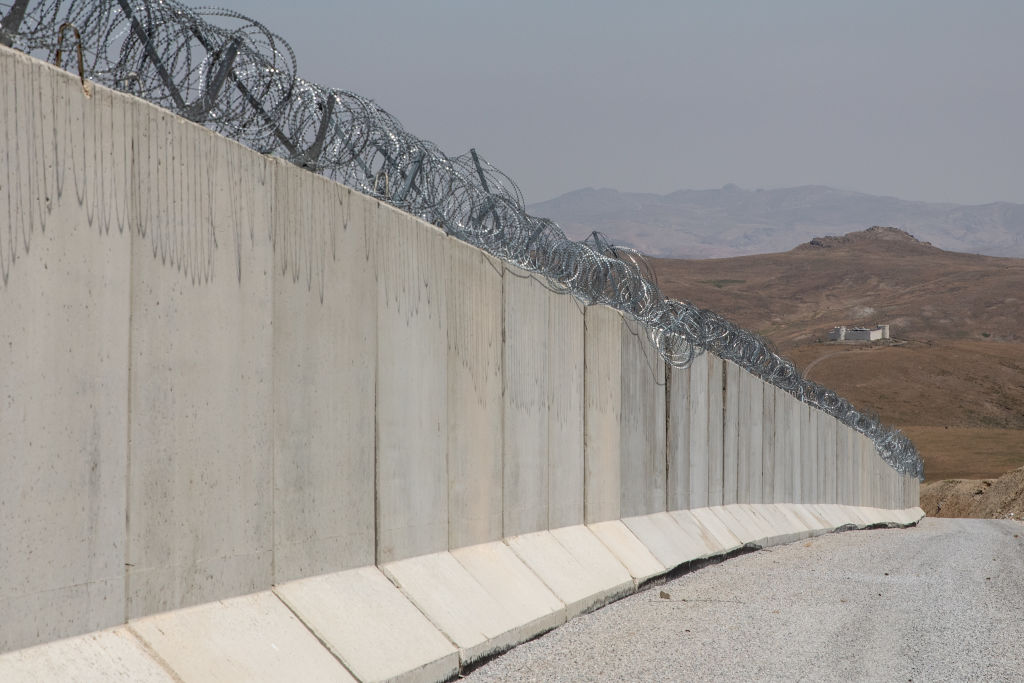 CALDIRAN, TURKEY - JULY 10: An Iranian border outpost is seen in the distance behind a part of Turkeyâs newly completed border wall on the Turkey-Iran border on July 10, 2021 in Caldiran, Turkey. A growing number of Afghan refugees are fleeing into Turkey as the Taliban escalates its military offensive and the United States nears completion of its troop withdrawal after a two-decade war. Since US President Joe Biden announced the August 31 pull-out deadline, the Taliban advance has been swift, with reports claiming they have taken control of more than half of the countryâs 400 districts. Over the past months, Turkey has seen a steady rise in Afghan migrants, most entering the country illegally via a centuries-old smuggling route through Iran. The numbers may rise further after the US announced an expansion of its refugee program for those who worked for the US but did not qualify for Special Immigrant Visas. These Afghans, who are not eligible for evacuation flights, would have to leave Afghanistan on their own before receiving US assistance. Turkey is a likely destination. The Afghans migrating to Turkey via Iran travel largely on foot, navigating the treacherous mountain range that makes up the Iran-Turkey border. Assisted by an organized network of smugglers, migrants pay upwards of $1000 USD per person for a journey through safe houses, across Van Lake, around land-border checkpoints, and onward to cities like Ankara and Istanbul. Migrants often report severe beatings by Iranian border guards and poor safe house conditions, while the mountain crossing and boat trips have claimed many lives. Turkeyâs law enforcement agencies have stepped up efforts to break up the smuggling networks, in a bid to slow rising numbers and protect migrant lives. Turkey already hosts more than 5.5 million asylum seekers. As the security condition in Afghanistan continues to deteriorate, fears of a new refugee crisis loom. (Photo by Chris McGrath/Getty Images)
CALDIRAN, TURKEY - JULY 10: An Iranian border outpost is seen in the distance behind a part of Turkeyâs newly completed border wall on the Turkey-Iran border on July 10, 2021 in Caldiran, Turkey. A growing number of Afghan refugees are fleeing into Turkey as the Taliban escalates its military offensive and the United States nears completion of its troop withdrawal after a two-decade war. Since US President Joe Biden announced the August 31 pull-out deadline, the Taliban advance has been swift, with reports claiming they have taken control of more than half of the countryâs 400 districts. Over the past months, Turkey has seen a steady rise in Afghan migrants, most entering the country illegally via a centuries-old smuggling route through Iran. The numbers may rise further after the US announced an expansion of its refugee program for those who worked for the US but did not qualify for Special Immigrant Visas. These Afghans, who are not eligible for evacuation flights, would have to leave Afghanistan on their own before receiving US assistance. Turkey is a likely destination. The Afghans migrating to Turkey via Iran travel largely on foot, navigating the treacherous mountain range that makes up the Iran-Turkey border. Assisted by an organized network of smugglers, migrants pay upwards of $1000 USD per person for a journey through safe houses, across Van Lake, around land-border checkpoints, and onward to cities like Ankara and Istanbul. Migrants often report severe beatings by Iranian border guards and poor safe house conditions, while the mountain crossing and boat trips have claimed many lives. Turkeyâs law enforcement agencies have stepped up efforts to break up the smuggling networks, in a bid to slow rising numbers and protect migrant lives. Turkey already hosts more than 5.5 million asylum seekers. As the security condition in Afghanistan continues to deteriorate, fears of a new refugee crisis loom. (Photo by Chris McGrath/Getty Images)Potrivit acestuia, mare parte din zid a fost finalizată, iar aproape 150 de kilometri de șanțuri au fost deja săpați. Totodată, ministrul a adăugat că avanposturile de la frontieră au fost întărite și consolidate.





comentarii: